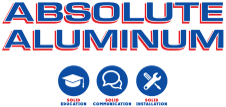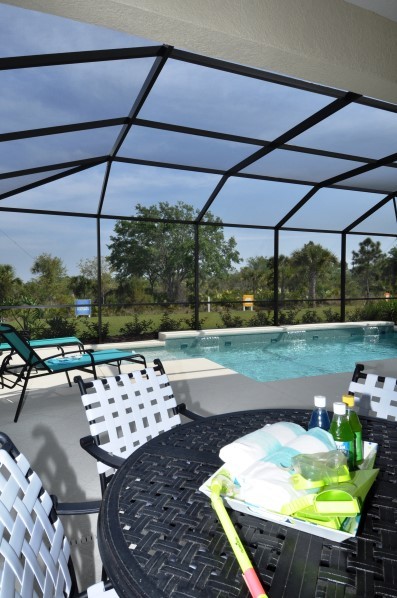We want to help homeowners navigate the process of purchasing a new pool cage, screen enclosure and their additional products. Here is a checklist of details that will allow you to compile questions to ask from a prospective home improvement company.
Pool Cage Materials
Remember not to make decisions with minimal facts- gather all of the info that you need from a sales representative when you are seeking bids for your project. Although the core materials being used may be similar, you need to do a thorough comparison of the ancillary materials such as; fasteners, screen type, screen door quality, hardware quality and/or any other newer technology that will make your enclosure operate smoother, look better and last longer!
If you don’t ask, companies will give you the cheapest components they can get away with, in an effort to save money and increase their profit. With Absolute Aluminum, you are given the choice of 6 different packages, built to your specific project, and with investment options to fit every budget. Every detail is there for you to review and choose, from fasteners and screen, to upgrades like Nebula lighting. We encourage you to get the facts prior to making a final decision. If you do your due diligence, in the end you should be very happy!
ALUMINUM FRAME
Most aluminum specialty companies are using the same stock aluminum for pool cages and enclosures. National aluminum distributors supply local companies who pre-cut the frame as specified in the engineering. Color options are generally limited to white and bronze.
BEAM CONNECTIONS
The preferred means of connecting trac beams is to use beam knuckles with internal gusset plates. To save money some companies use a scissor connection (overlapping the beams) to create a splice. The scissor connection does not have the strength of the aforementioned connection and doesn’t look as nice.
Absolute Aluminum specs: All of our connections are beam knuckles with internal gusset plates.
FASTENERS
Most companies will use zinc fasteners because they are readily available and very inexpensive. If you’ve seen rusted heads or rust rings around the fasteners in an enclosure, this is typical of how zinc fasteners rust over a period of time.
Some companies will upgrade you to a stainless fastener. Albeit an improvement over zinc, make sure you know what grade of stainless they are using. There are two grades of stainless, 401 (basic) and 18/8 (premium). 401 stainless heads will still rust; it just takes a little longer than a zinc fastener. They are also dissimilar metals, which creates a reaction and over time begins to deteriorate the fastener at the head.
There is a more significant upgrade to a quality 18/8 stainless fastener. Again, stainless fasteners are a soft metal and the white or bronze paint can flake off the head when the screw driver from the drill is torques down the screw head. Additionally, you still have a dissimilar metal occurrence with the stainless and aluminum touching. However, we would definitely recommend the 18/8 stainless over the aforementioned alternatives and is worth the additional money.
One innovative product worthy of consideration is the Nylo-Tec™ and Pro-Tec™ fasteners which feature a polycarbonate head attached to a metal screw coated in a rust resistant material. The benefits are three fold; the polycarbonate heads don’t chip when fastened because they’re not painted, the polycarbonate head will never rust, and you eliminate the dissimilar metal occurrence because the polycarbonate head is touching the aluminum. Throw in the fact that the coated screw is made of a stronger material (steel) instead of the softer (stainless), this innovative fastener is superior to all options available for enclosures subjected to the Florida weather.
SCREEN
There are many varieties of screen available to choose from depending on your needs and budget. We’ve broken this into (2) categories; Basic screen and Specialty screen:
BASIC SCREEN
Imported Screen – if you don’t ask or not familiar with screen, many companies will use screen imported from overseas which costs considerably less than screen made in the U.S.
The quality doesn’t come close to matching U.S. manufactured screen.
Basic fiberglass – Most companies will include basic fiberglass screen with your enclosure. National manufacturers like Phifer and Twitchell supply most of the screen in the U.S. and have developed innovative additives which allow the screen to last longer.
SPECIALTY SCREEN
Pet Screen
If you have a dog or cat that is getting through your screen or causing screen damage, consider Pet Screen. Considerably stronger than ordinary insect screen, Pet Screen is a heavy duty screen made of strong vinyl coated polyester. It resists damage by pets and is infused with a Microban® antimicrobial product for added protection.
Privacy Screen
For those in search of privacy, there are options available to obscure the view from the outside. Sometimes referred to as “Florida Glass,” this privacy screen is made of vinyl laminated fiberglass and gives the look of obscured glass. Privacy screen will also keep debris out of the enclosure.
ADDITIONAL ACCESSORIES
Absolute Aluminum has always been on the cutting edge of technological advancements in building materials for its pool cage and screen enclosure customers. We offer 2 products that are tested and approved for use in Florida and available exclusively through Absolute Aluminum.
E-Z Clean
This innovative product was developed to solve 2 long standing issues with all pool cage owners. Pool decks are designed to slope ever so slightly to the outer edge, which forces the rain water to travel to the bottom rail of the cage. E-Z cleans can now be inserted along various points of the bottom rail to allow the water to easily be pushed through the port and reduces the amount of standing water when washing off your deck. If you’ve ever attempted to hose down your deck for cleaning, you typically chase the dirt and water to the nearest door in your cage. Now you can push that dirt and water through the nearest E-Z Clean port and reduce the amount of time and water spent cleaning your deck.
Armor Plate
Armor Plate, exclusive to Absolute Aluminum, acts as a barrier between your deck and the bottom 1×2’s. This protective layer is essential because man-made products typically used on or in decks, contain lime, which can lead to the oxidation of aluminum over time. By incorporating the Armor Plate, Absolute Aluminum ensures that these components maintain their integrity and appearance, and effectively prevent the corrosive effects that lime can cause.
ALUMINUM DOORS
Armor Plate
As you’ve probably already experienced, the standard pool enclosure door is about as basic as it gets. You start with a push button handle set (typically made overseas) with a clip lock and adjustable keeper, a simple hydraulic door closer and a rubber door sweep on the bottom of the door. Be prepared to replace the core components over time as they break down or wear out.
Upgraded Door
If you want a door that has a superior feel and quality, spend a little more money and upgrade your door(s). It begins with a thicker, heavier aluminum door. This gives the door a completely different feel when operating. Most upgraded doors should feature a continuous piano hinge which gives you years of trouble free operation. The Z Bar should have felt weather stripping for quiet closure and to minimize any bug infiltration. The bottom of the door should have an adjustable door sweep (bug channel) for a tighter seal on all surfaces.
Upgraded Hardware
The handle set should include a Tasman keyed security lock for better security at the door. The lock set should penetrate the frame (vs. the basic plastic closure and keeper). A heavy duty closure tube will work more efficiently and have fewer problems long term.
If you’re getting a new cage or enclosure, it’s well worth the money to upgrade to a better door and hardware package, which you’ll enjoy more and will save you money over time.
COMPANY INSTALLERS or SUB-CONTRACTORS
Home improvement companies will generally look to get the labor done as inexpensively as possible. Is that what you want? Make sure you know who is coming out to install your pool cage or enclosure you just purchased. How experienced is the crew? How long have they been doing this specific work?
Find out if the people doing your installation are sub-contractors or company installers. There are good and bad sub-contractors. The difference may be how much of his heart is in your project. You have the right to ask if your installers are subs or company employees. You have the right to ask how long they’ve been installing your product. The installation will be one of the most important steps in determining your overall satisfaction with your purchase.
JOB SCOPE & EXPECTATION
A professional installation team will meet with you prior to starting the work and review the scope of work and the plan of action. How long will the installation take? Do they clean up and haul away any debris from the job site. Ask for a complete walk through inspection of the work done and a sign off that the work is completed.
SERVICE DEPARTMENT
Does the company you choose have a full-time service department? Do they offer a warranty with their products? Do they charge you for service calls? Do they charge you for labor? How long does it take to get service when you need it? These are important items for you to know. Which company will service you long after the pool cage or enclosure is installed?
STATE CERTIFIED GENERAL CONTRACTOR (GC)
When choosing a company, do they have the appropriate licenses in order to pull a permit for your project? Does the company have a General Contractor license? Have they provided you a copy of their license to show it’s active and current? Many home improvement companies use a “qualifier” contractor which is able to pull permits for the home improvement company. If the company you choose doesn’t have their own general contractor license, then make sure the company is using a legal qualifier and the relationship between the two parties is recognized by the state of Florida.
PERMITS & INSPECTIONS
Make sure the company doing your home improvement project pulls a permit to do the work specified in your contract. Work performed without a permit is considered illegal and is subject to a code enforcement violation. A code enforcement officer can “red tag” the job if there is no permit for the work being done, if the work being done is not specified in the permit or if it is being done by an unlicensed or improperly insured party. Make sure a copy of the permit is properly displayed at the job site in advance of any work being performed. This protects you and your home.
GENERAL LIABILITY INSURANCE
A general liability insurance policy protects your home and the possibility of any unforeseen damage that may occur as a result of the work being done. Most policies cover each project up to $1,000,000 against any damage that may occur. Home Improvement companies are required to have this, however, if the work is being performed by a contractor that is a qualifier, make sure the contractor has a valid policy as well. Demand to have a copy of the GLI declaration page for your records to validate the policy is valid and active.
WORKERS COMPENSATION INSURANCE
Anyone performing the work on your property should be covered by a workers comp policy. Again, this protects you from anyone who sustains an injury on your property. If not properly insured, you may be subject to the future cost of medical treatment from someone being injured on your property. Make sure the company can provide you a copy of their workers comp policy (or a legal exemption if properly qualified).
State certified General Contractor # CGC1528405, RX0061300 and EC13010018
Absolute Aluminum & Outdoor Living
Venice, FL 34285


